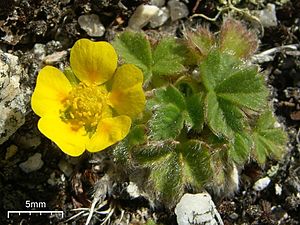Potentilla villosa facts for kids
Quick facts for kids Potentilla villosa |
|
|---|---|
 |
|
| Conservation status | |
| Scientific classification | |
| Genus: |
Potentilla
|
| Species: |
villosa
|
Potentilla villosa, also known as villous cinquefoil, is a pretty flowering plant. It belongs to the rose family, called Rosaceae. You might also hear it called northern cinquefoil or hairy cinquefoil. This plant naturally grows in northwestern North America. You can find it from Alaska all the way down to Oregon, and also in Alberta, Canada. Some records also show it growing in eastern Asia.
Contents
Where Villous Cinquefoil Lives
This plant loves to live near the coast. You can often spot it on windy coastal bluffs or sandy beaches. It also grows in open meadows and cold, treeless areas called tundra. Sometimes, it even thrives in rocky, high-up places like alpine talus slopes.
What Villous Cinquefoil Looks Like
This plant is a type of perennial herb. This means it lives for more than two years. It grows from a thick underground stem called a rhizome. Several hairy or woolly stems sprout from this base. These stems can grow up to 20 to 30 centimeters (about 8 to 12 inches) tall.
Leaves and Flowers
The leaves at the bottom of the plant are thick and feel a bit like leather. Each leaf is made up of three smaller leaflets. These leaflets have clear veins and jagged edges. Their undersides are covered in soft, woolly or silky hairs. You might also see a few similar-sized leaves higher up on the stem.
The plant produces one to five flowers in a cluster called an inflorescence. Each flower has five green parts called a calyx at its base. It also has five small leaf-like structures called bractlets. The flower itself is shaped like a bowl. It has five bright yellow petals, each up to 1.2 centimeters (about half an inch) long. Each petal has a small orange spot at its base. In the center of the flower, you'll usually find about 20 stamens, which are the parts that produce pollen.
When it Blooms
Villous cinquefoil typically blooms during the summer and early fall. You can see its cheerful yellow flowers from July through September. After the flowers fade, they produce small fruits called achenes, which grow in clusters.


